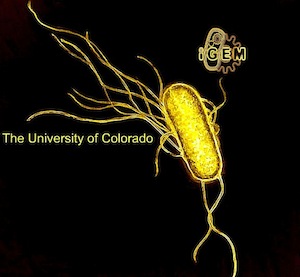Team:CU-Boulder
From 2012.igem.org

Welcome to the CU-iGEM 2012 wiki! This is the first time the University of Colorado has competed in the International Genetically Engineered Machines competition, and we are excited to show you the science coming out of Boulder, Colorado! We are a team of five undergraduates advised by our two graduate mentors, and a smattering of post-docs. This year is also the grand opening of the brand new Biofrontiers building for bioscience, and biotechnology research. We have been fortunate enough to have lab space in the new building.
|
Bacterial Nightlight  Certain organisms use bioluminescence for communication, mating, or intimidating predators. Our project aims to harness the bioluminescence genes, known as the Lux operon, from Aliivibrio fischeri, to make a genetically engineered E. Coli machine. The six genes of the 9-kilobase Lux operon, LuxCDABE and G, are regulated by LuxI and LuxR and produce blue-green light through the following reaction: FMNH2+O2+R-CHO → FMN + R-COOH + H2O + Light Instead of simply transforming an E.Coli with the Lux operon under a single promoter, we have isolated each of the six genes independently and placed them under different promoters to optimize the system and produce the maximum amount of light. The entire system is regulated by a light-repressed promoter so the bacteria only luminesce during nighttime. In conclusion, we have created the first ever bacteria night light! Possible real world applications for this are endless and include illuminating street signs, marking hiking trails, and even giving light to impoverished areas of the world that do not have access to electricity. |
No More Biofilm!  Our second project harnesses the use of quorum sensing to detect bacteria that secrete AHLs. The detection system then secretes factors that reduce the concentration of AHLs in the environment, thereby confusing the bacteria that use AHLs to communicate with each other. This is useful in preventing pathology from bacteria. When a threshold level of AHLs is reached in pathogenic bacteria, the signals activate transcription of pathogenic factors such as biofilm formation and host invasion signals. Disrupting the AHLs will inhibit these bacteria from creating biofilms or activating their pathogenic genes. We took advantage of the Salmonella enterica serovar typhimurium AHL receptor SdiA, a LuxR homolog. The SdiA transcription factor has been shown to be more sensitive to lower concentrations and a greater diversity of AHLs than LuxR. Therefore it will be activated by AHLs present before the AHLs can activate genes in the surrounding bacteria. We coupled it with both an RFP and an AHLase, Aiia. As a proof of concept, we grew up our E. coli with Vibrio fisheri, and showed that the recombinant E. coli could detect V. fisheri’s AHLs, and inhibit V. fisheri from activating its quorum response genes by not producing light. |
| You can write a background of your team here. Give us a background of your team, the members, etc. Or tell us more about something of your choosing. | |
|
Tell us more about your project. Give us background. Use this as the abstract of your project. Be descriptive but concise (1-2 paragraphs) | |
| Team CU-Boulder |
| Official Team Profile |
|---|
</html>
 "
"







 1
1 2
2 3
3 4
4 5
5 6
6

